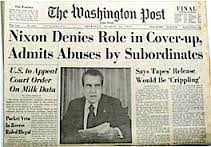Who Can Fire a CCO?
 There is something a little surreal when a CCO, while negotiating to join a company, raises the issue of his or her own termination. Not to be maudlin, but it is an important issue to consider.
There is something a little surreal when a CCO, while negotiating to join a company, raises the issue of his or her own termination. Not to be maudlin, but it is an important issue to consider.
The dangerous scenario is not so far-fetched. A CEO or someone from the C-Suite pushes to terminate a CCO because a CCO is likely to uncover some potentially improper conduct committed by the senior official. FCPA enforcement actions, as well as other criminal investigations, are replete with senior executives engaging in cover ups.
Aside from this scenario, however, there are other more subtle motivations that can lead to forces in a company who want to oust a CCO. Whenever a senior executive, like a CCO, seeks to implement change, there is always going to be resistance to such change. Such resistance may or may not be motivated by self-preservation or cover up but could be political as well. I know this sounds rather obvious but the corporate landscapes is riddled with the fallout from internal power struggles, and there is no reasons to think that CCOs are not at risk for such efforts.
Change is good, and change is hard (that is what makes it good – how do you like that for circular reasoning?). CCOs are often instigators of change and are frequent political targets in companies. CCOs need a strong alliance with the CEO and the board as well.
To protect against these political forces, CCOs should demand that their termination from a company can only be instituted by the Audit Committee. Such a restriction sounds like a good idea – CCOs cannot be terminated by the CEO or a gang of senior executives, unless and until the head of the Audit Committee terminates the CCO.
I am old enough to avoid being naïve and I am not suggesting that such a restriction is foolproof, but it is the best we can do under the circumstances. I have more confidence in an Audit Committee than I do in a company’s senior executives who may have more of a motivation to jettison a troublesome CCO who is blocking a business initiative or investigating senior executives.
Those who oppose such a restriction usually argue that the protection is more symbolic than anything because the CEO will go to the Audit Committee and demand the termination of a CCO to accomplish the same obstructionist strategy. My response is that the Audit Committee is at least one more layer of protection against a corporate cover up or political battle meant to prevent the CCO from carrying out his or her job.
It is easy to imagine in the corporate governance world how a CCO can be transformed into a negative force. Can you imagine for example, a CCO who learns of the VW emissions scandal and seeks support from senior management to address the problem? Or what if an active CCO was active in GM and learned about the cover up of the ignition switch issue and sought to address it with senior managers?
 From my perspective, it is naïve to suggest that CCOs are not at risk in these situations. To avoid a troubling firing of a CCO, requiring the Audit Committee to terminate the CCO can be an important protection against corporate misconduct at the higher level.
From my perspective, it is naïve to suggest that CCOs are not at risk in these situations. To avoid a troubling firing of a CCO, requiring the Audit Committee to terminate the CCO can be an important protection against corporate misconduct at the higher level.
A CCO with the backing of the Audit Committee can be a powerful force in the corporate landscape. I do not mean to suggest that the CCO is above everyone including the CEO, but at least there has to be a real and valid reason for terminating a CCO rather than allowing senior executives the ability to manufacture a pretext to terminate the CCO.
As CCOs rise in the corporate landscape, they have to be aware of the stakes. If CCOs want to be elevated and empowered in the C-Suite, they also have to be realistic about the world in which they operate – internal struggles, especially around compliance and potential legal violations, can lead to unfortunate and dangerous motivations. CCOs have to consider these possibilities when they join a company and seek termination protection provisions.















Micheal,
I fully support this. It has worked for me as an Audit Head and it would work for CCOs as well. Audit Committees are much more balanced and will ask the right questions of the CEO if he goes to them to get the CCO fired. They know there’s a AGM where they will be held accountable! And they also tend to think in terms of all stakeholders, rather than ‘just’ the CEO
Frank